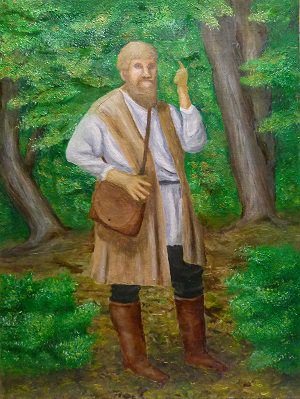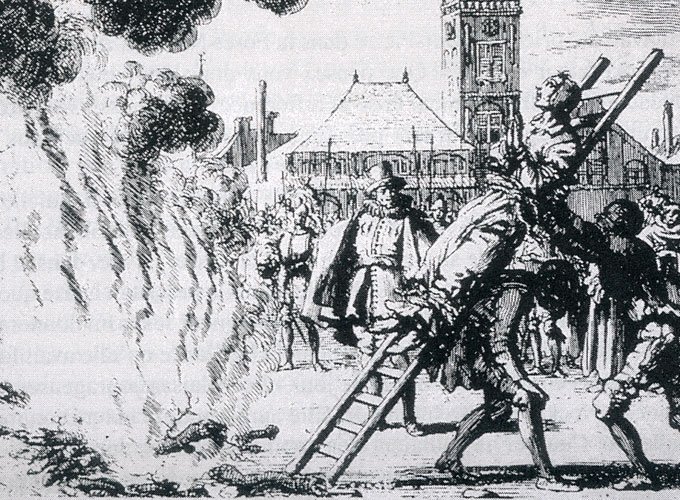|
Michael and Margaretha Sattler were ordinary people. People with simple joys and sorrows, hopes and fears like everyone else. And yet, in time of trial, they stayed faithful to Yahuwah. Their steadfastness in the face of opposition will be greatly rewarded in Heaven. Read their story and be inspired that what Yah has done for others, He’ll do for you, too. |
“Look, look at this. We got Hurricane Grace moving north off the Atlantic seaboard. Huge . . . getting massive. Two, this low south of Sable Island, ready to explode. Look at this. Three, a fresh cold front swooping down from Canada. But it's caught a ride on the jet stream . . . and is motoring hell-bent towards the Atlantic. What if Hurricane Grace runs smack into it? Add to the scenario this baby off Sable Island, scrounging for energy. She'll start feeding off both the Canadian cold front . . . and Hurricane Grace. You could be a meteorologist all your life . . . and never see something like this. It would be a disaster of epic proportions. It would be . . . the perfect storm.”
~ Todd Gross, TV Meteorologist
October 28, 1991: Near the end of hurricane season, a storm began developing in the Atlantic Ocean, east of Canada. The storm, a strong “nor’easter,” absorbed Hurricane Grace and became even larger. A ridge of high atmospheric pressure forced this massive storm south where it developed into an immense, and very powerful cyclone. It was a storm of epic, historic proportions created by a combination of factors that resulted in a disaster that directly claimed the lives of 13 people and did over $200 million damages. It was: “the perfect storm.”
 |
|
Image showing the Perfect Storm of '91, south of Nova Scotia, on October 30, 1991. |
Caught in the very middle of this convergence of powerful storms was a 22-meter commercial fishing vessel, the Andrea Gail. Captain Frank “Billy” Tyne, Junior, with his crew of five men, had been fishing out past the Grand Banks at the Flemish Cap. Despite weather reports warning of bad weather, the men decided to try for home because their ice machine had been malfunctioning and their load would not last much longer. Heading for home, they found themselves enveloped in the perfect storm.
Captain Tyne’s last recorded words were: “She's comin' on, boys, and she's comin' on strong.” Fuel drums, a fuel tank, an empty life raft and a few other flotsam were all that was ever found of the Andrea Gail. Captain Tyne and the five men with him accounted for nearly half the deaths lost in what later became known as the Perfect Storm of ’91.
Had it been only a thunderstorm, the men could have ridden it out. Had it been just a hurricane, they could have skirted round. Had their ice machine not malfunctioned, they could have remained at sea longer, not risking sailing through stormy seas. But it was the combination of factors that created a disastrous situation in which the ship sank with the loss of all lives on board.
A Perfect Storm
It was the best of times, it was the worst of times, it was the age of wisdom, it was the age of foolishness, it was the epoch of belief, it was the epoch of incredulity, it was the season of Light, it was the season of Darkness, it was the spring of hope, it was the winter of despair, we had everything before us, we had nothing before us, we were all going direct to Heaven, we were all going direct the other way—in short, the period was so far like the present period, that some of its noisiest authorities insisted on its being received, for good or for evil, in the superlative degree of comparison only.
~ Charles Dickens, A Tale of Two Cities
A “perfect storm” is: “A combination of events which are not individually dangerous, but occurring together produce a disastrous outcome.”1 Unlike regular storms, a perfect storm is caused by a “powerful combined effect of a unique set of circumstances.”2 Perfect storms don’t happen very often, but they’re always disastrous when they do.
 |
|
|
Sixteenth century Europe was a perfect storm of various—and often conflicting—ideas. In France, the Renaissance was at its height. In Germany, Martin Luther was translating the Bible into the common tongue, challenging the authority of the pope, and promoting the radical concept of salvation by faith alone. In Italy, Giordano Bruno was suggesting that stars were simply distant suns, possibly surrounded by their own planets while Pietro Pomponazzi was disputing the doctrine of the immortality of the soul. In the New World, Spain was conquering the Aztec Empire. Across Europe, Muslim armies were invading, killing and enslaving Christians as they went.
Europe itself was divided between Catholics and Protestants. The idea of natural law—that certain rights are inherent and common to all humanity—was gaining ground. The new ideas inspired new thoughts, new aspirations in the hearts of masses of downtrodden peasants who began revolting against the heavy taxes levied by their overlords. It created a “perfect storm” which, in turn, laid the groundwork for the Age of Enlightenment 200 years later. In this seething cauldron of chaotic change, one couple determined to follow truth, regardless of the cost. Their time of actively working for Yahuwah was actually very short—less than two years—but their influence, as well as their example of faithfulness in the face of persecution, continues to this day.
Around the time Christopher Columbus was trying to get financial backing for his attempt to find a new route to India by sailing west, a baby boy was born in Stauffen, Germany. Very little is known about Michael Sattler’s early life and education, but it is known that he entered the Monastery of St. Peter's near Freiberg. It is believed that he eventually became prior of this Benedictine monastery, which itself, suggests he had a good work ethic, was a capable administrator, and had a trustworthy character. As prior, he would have been second in charge of the entire monastery. This was a position of power and respect. It made Michael a member of the upper class of his day.
Because Michael was intellectually honest, he was devout in his beliefs. He was involved in the inter-Benedictine Bursfeld reformation, a spiritual renewal at St. Peter’s. As prior, he may have even been in charge of it. But change was coming, as it always must to those who are intellectually honest. Centuries later, United States president, Abraham Lincoln would observe: “When a man who is honestly mistaken hears the truth, he will either quit being mistaken or cease being honest.” And Michael was honest.
 |
|
St. Peter's Monastery in Freiberg, Germany, |
In the mid-1520s, Protestant peasants captured St. Peter’s Monastery. They demanded freedom from the over-taxation and oppression by the nobility. With the new ideas of freedom and equality of all believers, they wanted justice and freedom based on the principles contained in Scripture.
Some of these peasants were Anabaptists. “Anabaptist” means baptized again, because they rejected infant baptism as unscriptural. “How can a newborn infant make a knowing decision to serve Yahuwah?” They demanded. After all, the Saviour Himself wasn’t baptized until He was an adult: “Now when all the people were baptized, it came to pass, that Yahushua also being baptized, and praying, the heaven was opened, and the Holy Ghost descended in a bodily shape like a dove upon Him . . . And Yahushua Himself began to be about thirty years of age.” (Luke 3:21-23, KJV)
It is possible, even likely, that the peasants presented their appeals to Michael, as prior. While no written record of his thoughts has been preserved, three facts are known:
- Michael Sattler was intellectually honest and a devout Christian man. As such, when truth was pointed out, he did not hesitate to accept it.
- Michael left the monastery in mid-1525.3
- After leaving St. Peter’s, Michael traveled to the Waldshut area from where many of the revolutionaries had originally come.
With these known facts, it is safe to conclude that, as an intellectually honest man, Michael became sympathetic to the peasants’ cause and interested in, if not out-right convicted, of their beliefs. Certainly, after arriving at Waldshut, he had the opportunity to study further into the beliefs held by the Anabaptists.
A few months later, November 6 to 8 of that same year, Michael attended the famous infant baptism disputation in Zurich, Switzerland. He likely went simply to hear the arguments, for and against the subject. “By 1525 the reformation was firmly established in the city of Zurich.”4 However, the Protestants in Zurich had not yet grasped the concept of true religious liberty: the right of the individual to worship freely as dictated by his or her own conscience. The Protestant authorities who vigorously persecuted the Anabaptists, arrested Michael and threw him in prison. He was finally released on November 18, 1525, after promising to leave the region.
This early opposition was simply a foretaste of what was soon to come.
Work for the night is coming . . .
True character is revealed in the choices a human being makes under pressure – the greater the pressure, the deeper the revelation, the truer the choice to the character’s essential nature. ~ Robert McKee, Story
 |
|
Oil painting of artist's conception of the Anabaptist leader Michael Sattler preaching in the woods. |
Sometime during 1525 to 1526, Michael married a woman by the name of Margaretha who had been a Beguine nun. Like Michael, Margaretha was intellectually honest and had left the order based on her personal convictions of truth. In June of 1526, Michael was re-baptized as an adult. This took great courage on both of their parts, for it is probable that Margaretha was also re-baptized.
The earliest reformers defended liberty of conscience as a Yah-given right. However, just as soon as Protestantism became the state religion, it also became a persecuting power.
It is a fact recognized by many recent historians, that the persecution of the Anabaptists surpassed in severity the persecution of the early Christians by pagan Rome! Persecution began in Zurich soon after the Brethren had organized a congregation. Imprisonment of varying severity, sometimes in dark dungeons, was followed by executions. Within a short period the leaders of the Brethren lost their lives in the persecution.
Anabaptism was made a capital crime. Prices were set on the heads of Anabaptists. To give them food and shelter was a made a crime. The duke of Bavaria, in 1527, gave orders that the imprisoned Anabaptists should be burned at the stake — unless they recanted, in which case they should be beheaded.5
The dangers of laying aside error and following truth were very real. Michael and Margaretha loved truth, however. Truth was more precious to them than anything else. James Lane Allen wrote: “Adversity doesn’t build your character, it reveals it.” And that is true of the Sattlers. Adversity revealed characters refined in the school of Heaven, shining with the reflected light of the Saviour.
The quality of character Michael and Margaretha had is revealed in their continued friendship with those who disagreed with their beliefs. In late 1526, Michael went to Strasbourg where he stayed with Wolfgang Capito, a German humanist and leading Protestant reformer. While in Strasbourg, Michael also met with another Protestant reformer, Martin Bucer. Capito and Bucer disagreed with Michael on a number of points, including the Anabaptist stance against infant baptism. “Protestants at this time despised Anabaptists because of their views, and because most were uneducated and unsophisticated. Michael, however was on their social level and they came to respect him. He called on them to release the Anabaptists they had imprisoned.”6 Despite their differences in belief, Michael’s kind and gracious spirit can be seen in the fact that he referred to Capito and Bucer as his “beloved brothers in God.”
Even among believers today, many who follow truth take a harsh, condemnatory spirit against those who have not followed on to embrace new light. It is easy to denounce as lost those who cling to old error. Michael’s loving, Christ-like spirit to those who did not share his views is a witness to everyone following truth today. A kind, gentle regard for another, showing respect for another person’s dignity, awakens the same in the heart of the other person. After Michael’s execution, Capito and Bucer themselves referred to him as their “dear friend in God.” This says a tremendous amount about the character of Michael Sattler during an era when even other Protestants were known to torture and burn at the stake those with whom they disagreed.
Michael’s time working for Heaven was very short, but the ripples from the work he did during that time are still felt today. In January to February of 1527, Michael traveled to Lahr, a town north of Freiburg, to share the truth with others. In late February, he traveled to the village of Schleitheim for an important meeting amongst the Anabaptist believers. It was a secret meeting. Times were dangerous. Those who stepped to the front as leaders had a life expectancy of only two years. Michael’s was far less.
Michael presided at the meeting on February 24, where the Anabaptists came to an agreement regarding their beliefs. It was very revolutionary for the time. Besides rejecting infant baptism, they denounced the swearing of oaths as contrary to the words of Yahushua; they stated that baptism was merely an outward act to demonstrate a believer’s conscious profession of faith; and, most startling of all, called for the complete separation of Church and State!
Having agreed upon a statement of seven articles, Michael wrote up their Confession of Faith in a document called the Schleitheim Confession. This document continues to have enormous authority among Amish, Mennonite, and Baptist churches to this day.

The village of Schleitheim, north of Zurich near the German border.
“These are the times that try men’s souls . . .”
I learned that courage was not the absence of fear, but the triumph over it. The brave man is not he who does not feel afraid, but he who conquers that fear. ~ Nelson Mandela
There is a spiritual high that comes with doing what you know to be right. Without a doubt, Michael and Margaretha Sattler felt joy and hope for the future of truth following the successful meeting at Scheitheim. It was not to last long, however. Peter warned: “Be sober, be vigilant; because your adversary the devil, as a roaring lion, walketh about, seeking whom he may devour.” (1 Peter 5:8, KJV)
Whenever truth gains a victory, the opposers of truth will do their utmost to fight against it. Just a short time after the Schleitheim meeting, Michael and Margaretha Sattler, along with a number of other Anabaptist believers, were arrested in Horb by order of Count Joachim von Zollern, the regent for Archduke Ferdinand of Austria. After their arrest in March 1527, they were taken to the prison tower in Binsdorf.
These were normal human beings. The arrest, so quickly following the triumphant meeting at Schleitheim, left the handful of believers feeling shaken and afraid. No one wants to face persecution, torture, and death. From prison, Michael wrote a letter to them, encouraging them to be strong and full of faith.
I say to you through the grace of [Yah], that, ye be valiant, and walk as become the saints of [Yah]. . . . Let no one divert you from your aim, as has been the case with some even until now; but go straight on in all patience, without deviating, that you do not take up the cross which [Yah] has laid upon you, only to lay it down contrary to the honor and praise of [Yah], and to the transgression and violation of His eternal, true, just, and life-giving commandments.
Do not become weary, if you are chastened of [Yahuwah] . . . for whom [Yah] loves He chastens, even as a father that is well pleased with his son. To what will you have recourse, if you would flee from [Yah]? What can help you if you forsake [Yah]? Is it not [Yah] who fills heaven and earth?
. . . And let no man remove you from the foundation which is laid through the letter of the holy Scriptures, and is sealed with the blood of Christ and of many witnesses of [Yahushua]. . . . Judge what I write to you; take these matters to heart, . . . that you be found humble, fruitful and obedient children of [Yah]. Beloved brethren, marvel not that I treat this matter with such earnestness; for I do so not without reason. The brethren have doubtless informed you that some of us are in prison; and afterwards when the brethren at Horb had also been apprehended, they brought us to Binzdorf. At this time we met with various designs of our adversaries. Once they threatened us with bonds; then with fire, and afterwards with the sword. In this peril I completely surrendered myself into the will of [Yahuwah], and together with all my fellow brethren and my wife, prepared myself even for death for His testimony and then I thought of the great number of false brethren, and of you, who are but few, namely, a little flock; and also, that there are but few faithful laborers in [Yahuwah’s] vineyard . . . hence I deemed it necessary to stir you up by this admonition, to follow after us in the divine warfare, in order that you may comfort yourselves with it, that you may not become weary of the chastening of [Yahuwah].7
 |
|
|
Michael’s words shine as pure gold, undimmed by the centuries. His faith in Yahuwah, his love for truth, was unwavering.
The trial took place May 17-18, 1527, in Rottenburg. Michael spoke in defense of all the prisoners, appealing to the Scripture as the ultimate authority in matters of right and wrong.
Michael understood that true spirituality is much more than just lip service to one’s beliefs: it is heart work. For example, in his defense explaining why Anabaptists were opposed to taking up arms, he said:
If the Turks should come, we ought not to resist them; for it is written: Thou shalt not kill. We must not defend ourselves against the Turks and others of our persecutors, but are to beseech [Yahuwah] with earnest prayer to repel and resist them. But that I said, that if warring were right, I would rather take the field against the so-called Christians, who persecute, apprehend and kill pious Christians, than against the Turks, was for this reason: The Turk is a true Turk, knows nothing of the Christian faith; and is a Turk after the flesh; but you, who would be Christians, and who make your boast of Christ, persecute the pious witnesses of Christ, and are Turks after the spirit.8
It took tremendous courage to make such a statement. He summarized his defense with another bold statement:
Ye ministers of [Yah], I admonish you to consider the end for which [Yahuwah] has appointed you, to punish the evil, and to defend and protect the pious.
“Whereas, then, we have not acted contrary to [Yah] and the Gospel, you will find that neither I nor my brethren and sisters have offended in word or deed against any authority. Therefore, ye ministers of [Yah], if ye have not heard or read the Word of [Yahuwah], send for the most learned, and for the sacred books of the Bible, of whatsoever language they may be, and let them confer with us in the Word of [Yah]; and if they prove to us with the Holy Scriptures, that we err and are in the wrong, we will gladly desist and recant and also willingly suffer the sentence and punishment for that of which we have been accused, but if no error is proven to us, I hope to [Yah], that you will be converted, and receive instruction."
Upon this speech the judges laughed and put their heads together, and the town clerk of Ensisheim said, "O you infamous, desperate villain and monk, shall we dispute with you? The hangman shall dispute with you, I assure you."
Michael said, "[Yah’s] will be done."9
After deliberating for just an hour and a half, the judges returned and pronounced sentence:
In the case of the Governor of his Imperial Majesty versus Michael Sattler, judgment is passed, that Michael Sattler shall be delivered to the executioner, who shall lead him to the place of execution, and cut out his tongue; then throw him upon a wagon, and there tear his body twice with red hot tongs; and after he has been brought without the gate, he shall be pinched five times in the same manner.10
It was a horrific, torturous sentence: having his tongue cut out and flesh gouged from his body with red hot pinchers, only to finally be burned alive. Some of the prisoners recanted. Michael, however, stayed strong. On May 20, 1527, Michael was taken to the town square in Rottenburg and tortured. Through these proceedings, his faith never wavered. Despite having part of his tongue removed, he continued to pray, saying:
“Almighty, eternal [Yah], thou art the way and the truth; because I have not been shown to be in error, I will with thy help on this day testify to the truth and seal [sic] it with my blood." He was then pushed into a large fire. As the ropes around his hands were burned away, Sattler gave a signal to his group to show them he was confident about his fate and prayed, "Father, I commend my spirit into thy hands."11

On May 20, 1527, Michael Sattler was tied to a ladder after being tortured, then toppled onto a fire, sealing his testimony with his blood. He had been an Anabaptist for less than two years.
Faithful Unto Death
“Real courage is when you know you're licked before you begin, but you begin anyway and see it through no matter what.”
~ Harper Lee, To Kill A Mockingbird
Very little is known of Margaretha Sattler but she was soon to join her husband in death. Margaretha “was obviously a woman of strong convictions and is one of the very few women actively associated with the Reformation. Many of the other women imprisoned with her were wives of the Radicals, but many of them were released due to their lack of actual involvement in the movement and because the majority of them recanted after they were captured.”12
Her courage and strength even impressed the Countess of Hechingen, the wife of Count Joachim von Zollern under whose orders the Sattlers had been arrested and who was the principle judge at their trial. The countess visited Margaretha in prison, urging her to recant and promising her a place to live at her court.
Margaretha’s response to the countess shows the strength of her own convictions. When the countess suggested that Margaretha was in prison simply because she was being a dutiful wife, obeying her husband, Margaretha bravely replied: “I do not follow my beliefs because of my husband. I follow my husband because of my beliefs.”13
Two days after her husband was burned to death, Margaretha was taken to the Neckar River and drowned, on Wednesday, May 22, 1527. They had been married, at most, for only two years; leaders for less than one.

A memorial to Michael and Margaretha Sattler states simply: "They died for their faith."
“Surrounded by so great a cloud of witnesses . . .”
Courage is resistance to fear, mastery of fear - not absence of fear. ~ Mark Twain
Michael and Margaretha Sattlers’ lives were cut too short, but for those who would live to see Yahushua return, those who must live through the closing days of earth’s history, honoring Yah, they are a shining light: a promise that what Yah has done for them, He can do for you, too.
Stuart Hamblen was a hard-living, hard-partying singer, actor, and radio host. After surrendering his life to Yahushua, he underwent an amazing transformation of life and character. Hollywood was abuzz—not to mention a little amused—that the once carousing tough-guy was now openly a Christian. One afternoon, Hamblen ran into a friend of his, fellow actor, John Wayne.
“What’s this I hear about you, Stuart?” Wayne asked.
“Well, you know what they say, John,” Hamblen replied. “It’s no secret what God can do.”
“Sounds like the name of a song,” Wayne mused.
Stuart Hamblen went home and turned it into a song. The testimony of Michael and Margaretha Sattler, the lesson they teach today, are well summarized by the words of the hymn:
It is no secret what [Yah] can do.
What He’s done for others, He’ll do for you!
With arms wide open, He’ll pardon you.
It is no secret what [Yah] can do.
Believers today have a very unique opportunity. We are now living in the closing days of earth’s history. The time of trouble is just before us. When the trumpets begin to sound, there will be no respite until the end. Unprecedented chaos is about to burst upon the world. When demons, posing as extraterrestrial beings, over run the earth, when the pope is exalted to be mankind’s representative, when false worship is enforced on pain of death, do you have the faith to remain obedient to the law of Yah? When Satan comes, impersonating Yahushua Himself, and claims to have changed the ancient Sabbath to Sunday on the Gregorian calendar, will you cling to the Word of Yah alone?
The thought of facing persecution and death may be terrifying to you. You may think that you don’t have the courage of martyrs. Guess what? They didn’t, either! That courage is a gift, given by Yah to His faithful children, when it is needed.
You don’t need to fear the days ahead. You don’t need to worry about whether you’ll break under torture. You can leave that all in the hands of a loving Father.
A perfect storm is coming! Evil forces, demonic and human, will combine to blot off the face of the earth all who honor Yahuwah.
Your part, right now, today, is to get to know Yahuwah so well, that you will cling to Him, to His promises, and His love, and nothing else.
Make the choice. Today! “With arms wide open, He’ll pardon you.” So go to Him.
Today.

A perfect storm is coming. Prepare today so that when it hits, you will not be moved.
“Yah is our refuge and strength, a very present help in trouble. Therefore will not we fear, though the earth be removed, and though the mountains be carried into the midst of the sea; Though the waters thereof roar and be troubled, though the mountains shake with the swelling thereof.” (Psalm 46:1-3, KJV)
3 Some sources suggest Michael may have left the monastery as early as 1523.
4 http://history-switzerland.geschichte-schweiz.ch/reformation-switzerland-calvin.html
5 http://www.gracegems.org/C/persecution_of_the_anabaptists.htm, emphasis original.
7 Thieleman Van Bragt and Jan Luyken, Martyrs Mirror, pp. 419-420.
8 Ibid., p. 418.
9 Ibid.
10 Ibid., p. 419.
13 As quoted in The Radicals.







